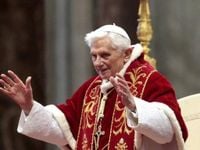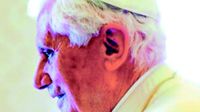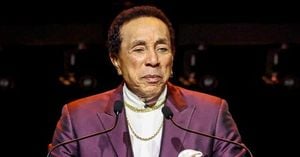On April 19, 2005, Cardinal Joseph Ratzinger was elected as Pope, taking the name Benedict XVI, marking a significant moment in the history of the Catholic Church. His election came after a swift conclave, where he presented himself to the world as "a simple and humble worker in the vineyard of the Lord." This year, the anniversary of his election coincides with Holy Saturday, a date that holds personal significance as it mirrors his birth on April 16, 1927.
The choice of the name Benedict was unexpected, as it had not been used by a pope since 1922. Cardinal Christoph Schönborn, who participated in the conclave, noted that the choice surprised everyone, indicating the weight of the decision made by Ratzinger. Schönborn played a pivotal role in convincing Ratzinger to accept the papacy, having previously written to him after the funeral of Pope John Paul II urging him not to refuse the election.
Ratzinger explained his choice of name during his first general audience on April 27, 2005, stating it was meant to honor Pope Benedict XV, who was known for his efforts toward peace during World War I. Ratzinger referred to Benedict XV as a "courageous and authentic prophet of peace," emphasizing the need for reconciliation and healing in a world marred by conflict. In addition, he drew inspiration from Saint Benedict of Norcia, the patron saint of Europe, highlighting the role of the Benedictine Order in spreading Christianity across the continent.
Throughout his pontificate, which lasted eight years, Benedict XVI was deeply concerned about the spiritual, cultural, and political state of Europe. Just days before the death of John Paul II, Ratzinger had delivered a speech in Subiaco, where he stressed the need for individuals to make God credible in the modern world. He warned of the "internal decline of the spiritual forces" in Europe, stating, "Europe would no longer be Europe if this fundamental cell of its social structure disappeared or was fundamentally changed." This concern for Europe's future became a recurring theme in his public interventions.
On April 2, 2005, John Paul II passed away, leading to a massive outpouring of grief and reverence from around the globe. His funeral was attended by approximately two million pilgrims, and the atmosphere in Rome was charged with emotion as cardinals gathered to elect his successor. Ratzinger, known for his intellectual authority and continuity with John Paul II's legacy, quickly emerged as a front-runner in the papal election. By the fourth ballot on April 19, 2005, he was elected Pope.
In his inaugural address, Benedict XVI emphasized his role as a servant leader, distancing himself from the temporal power often associated with the papacy. He described the papacy as a service and a testimony that could even lead to martyrdom, echoing the sacrifices of his predecessor. His first Mass was not labeled as an "inauguration" but rather as the beginning of his "Petrine ministry," reinforcing the idea of service over power.
Benedict XVI's papacy was marked by significant challenges, including the clergy sexual abuse scandal. He took decisive action to address these issues, imposing stricter rules on bishops to ensure accountability and transparency. He urged bishops to report offenders to civil authorities and demanded that the Church compensate victims. His personal engagement with abuse survivors was a poignant aspect of his leadership, as he sought to express sorrow and compassion for their suffering.
In a striking moment during the Via Crucis on Good Friday in 2005, Ratzinger spoke candidly about the "dirt in the Church," acknowledging the failings of clergy and the need for repentance. This openness was noted by Pope Francis, who remarked that Ratzinger's willingness to address difficult issues was a defining characteristic that contributed to his election.
As his papacy progressed, Benedict XVI faced increasing pressures, particularly regarding his public statements and the backlash from certain circles. In a letter dated January 2021, he expressed his reluctance to publish more books due to the "anger" directed at him from some factions in Germany. This sentiment highlighted the challenges he encountered in maintaining his theological perspectives amidst a rapidly changing cultural landscape.
On February 2025, journalist Andrea Cionci was questioned by the Vatican's Promoter of Justice concerning the "Ratzinger Code," a series of investigations into the legitimacy of Benedict's resignation. Cionci, who has spent years compiling evidence, argues that Ratzinger's resignation was manipulated and that he never truly abdicated. His claims suggest that the Declaratio, presented as a resignation, was instead a declaration of impediment, indicating ongoing tensions within the Church hierarchy.
The book "Benedetto XVI. L’eredità dalla vita e dalle opere," curated by historian Elio Guerriero, explores Ratzinger's life and legacy, detailing his theological contributions and the impact of his papacy. The book highlights his commitment to addressing abuse and the profound changes he sought to implement within the Church.
As the Church reflects on the legacy of Benedict XVI, his decision to resign remains a topic of discussion. Many view it as a courageous act that could inspire future leaders to prioritize the Church's spiritual health over institutional power. The complexities of his tenure and the controversies surrounding his resignation continue to shape the narrative of his time as Pope.
In summary, the 20th anniversary of Benedict XVI's election serves as a moment of reflection on his contributions, challenges, and the ongoing discussions about his legacy within the Catholic Church. His emphasis on humility, service, and the need for reform resonate as the Church navigates its future amidst a rapidly evolving world.





